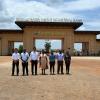The Micro Pillar targets to increase profitability, competitiveness and growth of enterprises in Uganda. Interventions in this pillar focus on sustaining efforts in reducing informality and increasing the competitiveness of the private sector through provision of massive BDS and strengthening the internal capacities of SMEs to comply with and compete for domestic, regional and global opportunities.
The pillar interventions include;
- Formalisation and professionalisation of MSMEs mainly through supporting the implementation of the National BDS framework, Informality management for compliance and resilience program, support the development of innovation and incubation ecosystem in Uganda, among others.
- Increasing access to financial services mainly through focusing on promoting alternative private sector financing products including equity financing, impact funds, investment clubs, promoting adoption of green growth strategy, among others.
- Enhanced women’s access to markets and resources mainly through tracking policies and interventions to remove structural barriers to women participation in markets.
- Enhancing factor productivity at the firm level mainly through tracking key productivity drivers in Uganda’s export sector at the firm-level, support the strengthening of product – specific producer organisations
Below are key updates on selected interventions
- National Business Development Services Framework
- Informality management for compliance and resilience intervention
- Innovation and Incubation ecosystem in Uganda
- Impact funds
- Investment clubs in Uganda
Status
Indicator | Status |
Access to Business Development Services. | Business Development Services are non-financial support services that help firms improve their performance and growth. These services encompass a wide range of support, including training, consulting, mentoring, access to markets among others. - The Ministry of Finance Planning and Economic Development (MFPED) through Enterprise Uganda (Eug) launched the National Business Development Services Framework in September 2022. The framework (FW) aims at strengthening management capabilities of local enterprises through mass provision of the BDS geared towards improving firm capabilities to drive growth, jobs and wealth creation.
- The NBDS FW provides for construction of the Centre of Excellence (CoE) which is intended to provide the institutional mechanism for developing and promoting BDS delivery and mobilization of stakeholders across the BDS ecosystem. Land was identified and construction started. It is currently at 80% completion rate.
- The National guidelines for mainstreaming BDS in MDAs have been developed by Ministry of Trade Industry and Cooperative.
- MTIC has embarked on conducting the Regulatory Impact Assessment to inform formulation of the National BDS Policy
- PSFU in partnership with MTIC and with support from Mastercard foundation produced 2 draft National BDS standards and submitted to UNBS. Stakeholder consultations have been done and the standards have been shared for public reviewing. More so, during formulation of the standards, 200 BDS providers were trained by Africa Management Institute
- To increase BDS mass uptake, mass delivery of BDS is on going under PDM conducted by Enterprise Uganda. 10,595 PDM SAACOs have been supported during establishment, capacity building of District Local Governments and Training of trainers, through Markets and Agricultural Trade Improvement Project (MATIP), Market Business Academy engagements with traders were conducted.
- The National BDS providers database has been developed by Ministry of Trade industry and Cooperatives to capture information on private and public BDS providers; so far, 175 providers have been registerd.
|
Access to Markets | - As of December 2024, EAC had operationalized 13 One Stop Boarder Posts (OSBPs) across key border points, streamlining customs and immigration processes by consolidating them into single facilities. These OSBPs are strategically located along major trade corridors, including the Northern Corridor (linking Mombasa to Uganda, Rwanda, and South Sudan) and the Central Corridor (connecting Dar es Salaam to Burundi and Rwanda). Additionally, as of August 2024, 274 non-tariff barriers (NTBs) have been resolved since 2007, with the EAC lately operationalizing the NTB App.
- In January 2025, the East African Community (EAC) Secretariat launched the upgraded Single Customs Territory (SCT) Centralised Platform, a tool designed to facilitate the seamless exchange of customs and trade data in real-time among interconnected Partner States’ Customs and Ports Authorities. By enabling real-time sharing of customs information, this platform addresses challenges such as customs clearance delays, non-tariff barriers, high transaction costs, and inefficiencies in cross-border trade
- Successful implementation of the Economic and Commercial Diplomacy (ECD) Strategy which will play a crucial role in providing access to markets by facilitating negotiations of Bilateral and Multilateral deals to facilitate trade and investment. Under the Strategy, Government sets to negotiate several trade agreements with regions such as the Gulf Cooperation Council (GCC), which will provide preferential access to the GCC market for Ugandan exports.
|
Access to Industrial Parks | Industrial parks are geographically demarcated areas for industrial development. They are key for private sector development for they increase efficiency and productivity, reduce production costs, facilitate business growth among others. During the FY 2025/26, GOU has budgeted for Shs.308Bn for infrastructure development. - So far, government has operationalized 8 industrial parks, which include (Namanve, Luzira, Bweyogerere, Mbale, Soroti, Kasese, Mbarara, and Jinja) industrial parks. We have also supported the development of three privately owned industrial parks, which are Liao Shen Kapeeka in Nakaseke District, MMP in Buikwe District, and Tian Tang in Mukono.
- To date, a total of 628 companies/industries have been allocated land within the various industrial parks, 47 percent of which are in manufacturing. Out of all the companies allocated land, 307 are fully operational, 195 are undertaking construction, and 122 have commenced preparatory activities. The parks have attracted a total capital investment of USD 4.5 billion and created 181,403 jobs.
Website: www.uia.go.ug |
Access to free zones | Free Zones are among the national policy tools that have been implemented in Uganda since 2014 to enhance access of locally manufactured goods into regional and global markets. - There are Thirty-one (31) private free zones of which Twenty-nine (29) are operational. Out of 12 public free zones, only one is under construction (Entebbe Airport Free Zone)
- The Entebbe Airport Free Zone was commissioned by H.E the President in December, 2024. It sits on 5 acres and upon completion it will have 6 warehousing facilities.
- The facility will host coffee roasting, packaging and export along with fruits, vegetables and flowers.
Website: www.ufzepa.go.ug |



